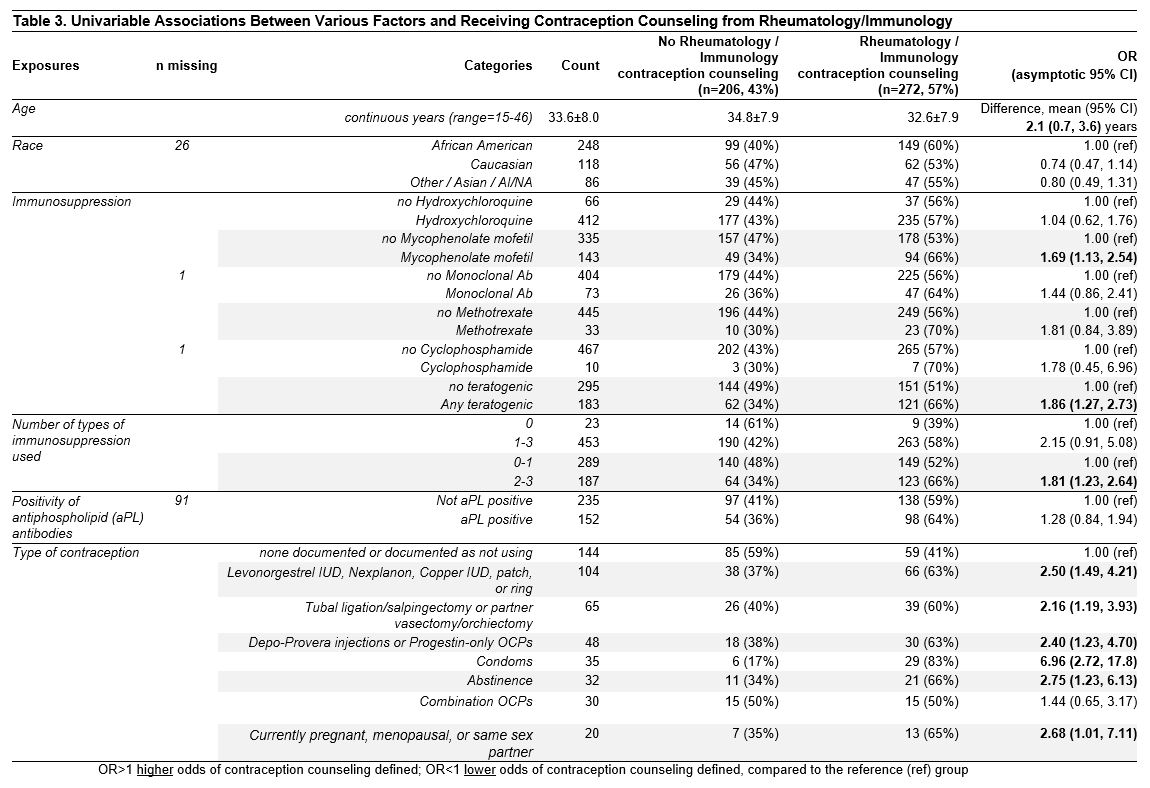Session Information
Date: Tuesday, November 9, 2021
Title: Reproductive Issues in Rheumatic Disorders Poster (1711–1731)
Session Type: Poster Session D
Session Time: 8:30AM-10:30AM
Background/Purpose: Systemic lupus erythematosus (SLE) primarily affects women of childbearing age, who have an increased risk of pregnancy complications such as preterm labor and preeclampsia, especially in the setting of active disease.1 Contraception counseling is important in this population given the teratogenic nature of some medications used for treatment.2 Our study describes the frequency of contraception counseling provided by multiple subspecialties to women with SLE, and investigates the associations between teratogenic medication use and receiving contraception counseling.
Methods: This was a retrospective cohort study following 478 women (aged 15-44) with an ICD diagnosis code of SLE over a 2-year period (6/2016-6/2018). Women were seen in outpatient subspecialty clinics in a large tertiary academic medical center. Those with a history of hysterectomy/bilateral oophorectomy were excluded. Demographic data was retrieved via the university-affiliated central data repository, and additional data, including documentation of contraception counseling, was obtained via manual chart abstraction. Univariable associations between categorical demographics or other clinical information and contraception counseling were assessed to produce unadjusted odds ratios and 95% confidence intervals (OR, 95% CI). T-tests were used to assess difference in age by contraception counseling.
Results: Data from 478 women (52% African American (AA), 25% Caucasian) with SLE were included (Table 1). Rheumatology/immunology was the subspecialty to most frequently provide contraception counseling (57%). Nearly 80% of women received counseling from at least one subspecialty, 44% from at least two. Factors associated with receiving contraception counseling were younger age, AA race, and use of more than one immunosuppressive medication (Table 2). Women on teratogenic medications (methotrexate (MTX), mycophenolate mofetil (MMF), or cyclophosphamide (CYC)) had higher odds of receiving contraception counseling from at least 1 subspecialty (OR, 2.01; 95% CI 1.23-3.26), from two or more subspecialties (OR, 2.18; 95% CI, 1.50-3.17), and from rheumatology/immunology (OR, 1.86; 95% CI, 1.27-2.73) (Table 3).
Seventy-one women (15%) had a documented pregnancy outcome during the study period; of those, 25 (35%) had an adverse pregnancy outcome (spontaneous abortion, preterm delivery, or intra-uterine fetal demise).
Conclusion: In this study, women with SLE on teratogenic medications (MTX, MMF, CYC) had higher odds of receiving contraception counseling from their rheumatologist and from at least two subspecialties. Multidisciplinary approaches to enhance contraception counseling should be encouraged. Further investigation is needed to understand factors associated with adverse pregnancy outcomes in this high-risk patient population.
- Clowse ME, Jamison M, Myers E, James AH. A national study of the complications of lupus in pregnancy. Am J Obstet Gynecol. 2008;199(2):127.e1-127.e1276.
- Sammaritano LR, Bermas BL, et al. 2020 American College of Rheumatology Guideline for the Management of Reproductive Health in Rheumatic and Musculoskeletal Diseases. Arthritis Care Res (Hoboken). 2020 Apr;72(4):461-488.
 Table 1. Summary of characteristics of patients in the SLE cohort (Nf478 women). Characteristics are divided into categories: demographics, counseling, immunosuppression, contraception, and pregnancy. Both number of women and percentages are reported. Unless otherwise specified, SD=standard deviation.
Table 1. Summary of characteristics of patients in the SLE cohort (Nf478 women). Characteristics are divided into categories: demographics, counseling, immunosuppression, contraception, and pregnancy. Both number of women and percentages are reported. Unless otherwise specified, SD=standard deviation.
 Table 2. Description of odds ratios (OR) and 95% confidence intervals (95% CI) for the univariable associations of various factors (demographics, immunosuppression types and number of medications, APL antibody positivity, and contraception methods) and receiving contraception counseling. Overall counts and percentages provided. Unadjusted odds ratio with asymptotic confidence intervals are provided and shown in bold when the null effect is excluded at alpha= 0.05. For continuous age, mean +/- standard deviation (SD) are shown and t-test used to test the difference between the counseling groups using the pooled method assuming equal variances.
Table 2. Description of odds ratios (OR) and 95% confidence intervals (95% CI) for the univariable associations of various factors (demographics, immunosuppression types and number of medications, APL antibody positivity, and contraception methods) and receiving contraception counseling. Overall counts and percentages provided. Unadjusted odds ratio with asymptotic confidence intervals are provided and shown in bold when the null effect is excluded at alpha= 0.05. For continuous age, mean +/- standard deviation (SD) are shown and t-test used to test the difference between the counseling groups using the pooled method assuming equal variances.
 Table 3. Description of odds ratios (OR) and 95% confidence intervals (95% CI) for the univariable associations of various factors (demographics, immunosuppression types and number of medications, APL antibody positivity, and contraception methods) and receiving contraception counseling from rheumatology/immunology. Overall counts and percentages provided. Unadjusted odds ratio with asymptotic confidence intervals are provided and shown in bold when the null effect is excluded at alpha= 0.05. For continuous age, mean +/- standard deviation (SD) are shown and t-test used to test the difference between the counseling groups using the pooled method assuming equal variances.
Table 3. Description of odds ratios (OR) and 95% confidence intervals (95% CI) for the univariable associations of various factors (demographics, immunosuppression types and number of medications, APL antibody positivity, and contraception methods) and receiving contraception counseling from rheumatology/immunology. Overall counts and percentages provided. Unadjusted odds ratio with asymptotic confidence intervals are provided and shown in bold when the null effect is excluded at alpha= 0.05. For continuous age, mean +/- standard deviation (SD) are shown and t-test used to test the difference between the counseling groups using the pooled method assuming equal variances.
To cite this abstract in AMA style:
Chandramouli S, Alvarez C, Silverstein R, Sheikh S. Teratogenic Medication Use Associated with Favorable Odds of Contraception Counseling in a Cohort of Women with Systemic Lupus Erythematosus at a Large Tertiary Academic Medical Center [abstract]. Arthritis Rheumatol. 2021; 73 (suppl 9). https://acrabstracts.org/abstract/teratogenic-medication-use-associated-with-favorable-odds-of-contraception-counseling-in-a-cohort-of-women-with-systemic-lupus-erythematosus-at-a-large-tertiary-academic-medical-center/. Accessed .« Back to ACR Convergence 2021
ACR Meeting Abstracts - https://acrabstracts.org/abstract/teratogenic-medication-use-associated-with-favorable-odds-of-contraception-counseling-in-a-cohort-of-women-with-systemic-lupus-erythematosus-at-a-large-tertiary-academic-medical-center/
